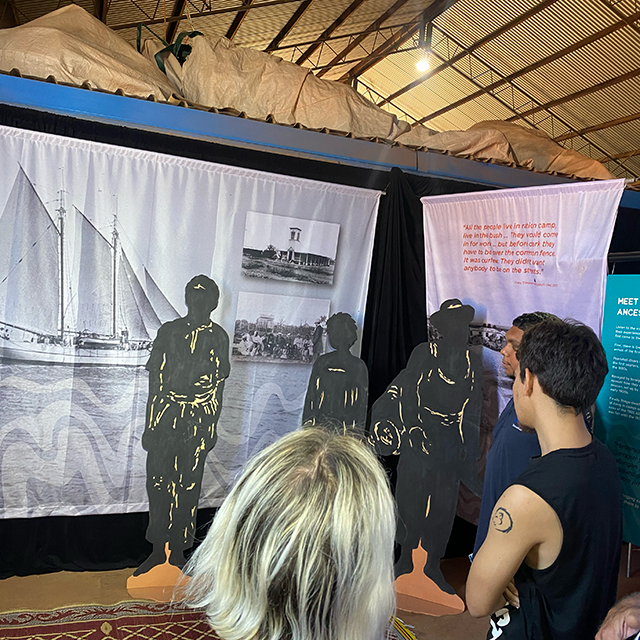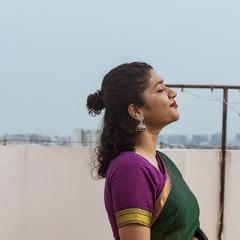Sai Meghna Reddy Gaddam
CBCS Master of Environmental Management Graduate
As a marine social scientist with a background in environmental management, I am extremely interested in collaborating with Indigenous communities to assist in the management of land and sea. To make this vision come true, I was looking for trusted pathways to enter and work alongside Traditional Owners. Enter Aurora Education Foundation’s internship. This opportunity became my solace and put a stop to that search. I got the opportunity to intern with Nyamba Buru Yawuru (NBY) in Broome, Western Australia, in the Environmental Services team.
Yawuru joint management
The Yawuru people are the Traditional Owners of Broome. There are four conservation parks, including a marine park, in the Yawuru joint management program, managed under varying arrangements. The in-town park (Minyirr Buru) is jointly managed by Yawuru Prescribed Body Corporate (PBC) and the Shire of Broome (SOB), with a service agreement with the Department of Biodiversity, Conservation and Attractions (DBCA). The terrestrial out-of-town park (Birragun) and the marine park (Nagulagun) are jointly managed by the Yawuru PBC and DBCA. The fourth Park (Guniyan Binba) is a tripartite arrangement with the SOB, DBCA and Yawuru PBC.
Internship Project
My project was to analyse the current stressors and challenges within this complex tri-partied joint land and sea management. This involved interviewing multiple stakeholders from regional managers to rangers from NBY, DBCA and SOB. Based on the findings, I was required to highlight the next steps and opportunities that would arise from the state providing a more sustainable and supportive framework. This was highlighted through the form of a letter submitted to the Minister to call out the way forward for a successful and sustainable joint management program.
I also had the opportunity to plan and coordinate operational support and reporting for the Joint Management Program – Yawuru Park Council and Marine Management Body. I deepened my knowledge surrounding project management and curated project proposals. I undertook crocodile surveys and drone surveys with the DCBA Rangers and Yawuru Country Managers.
My favourite part of the internship was spending time on Country. Watching these amazing Rangers protect and conserve country irrespective of the extreme conditions further increased my zeal to work in this space. I truly cherish my conversations with the Rangers. Their love for Country and their duty to care for it gave true meaning to my career change.

Photo credit: Sai Meghna
Working with the Indigenous Saltwater Advisory Group
Another highlight of my internship was supporting and working with the Indigenous Saltwater Advisory Group (ISWAG). ISWAG is auspiced by NBY and represents nine Traditional Owner Nations across the Kimberley Sea Country. This is a grassroots-level advisory group which has become a powerful united voice guiding management and conservation within the Kimberly region. This network supports the Traditional Owners to revive, maintain and sustain Traditional Ecological Knowledge. The group helps various Traditional Owner groups implement sea Country plans, facilitate the development of regional-level management plans and cultural protocols, enhance the Traditional Owners’ capacity for marine management and empower them to lead and participate in marine research and monitoring projects. ISWAG works as a “one-stop shop” for relevant stakeholders to engage with Traditional Owners in the Kimberly region for knowledge-sharing and marine conservation.
I was elated to use the two-way science method to collaborate with Kimberley Traditional Owners and empower them towards the successful execution of their Healthy Country plans through collaborative research, policy and management. I had the opportunity to strengthen my grant writing skills as I co-facilitated grant writing and strategic research and collaborative opportunities in alignment with regional ISWAG Turtle and Dugong Conservation.
Yawuru repatriation
A key moment in my internship that left a deep imprint in my heart was the Yawuru Repatriation Exhibition at Broome. This exhibition shares the truth about the Yawuru ancestors whose remains were returned from museums in Germany. The exhibition explores the pain faced by the ancestors and the healing experienced within the community when the remains were returned. It was an extremely emotional moment for me despite being a non-Yawuru person. I grieved their loss and felt a deep sense of equanimity when I understood how the desire of these ancestors to come back to their Country guided the current leaders to make their way to Germany and bring them home.
Throughout my internship, I did my best to align with the vision of Yawuru elders, which was to ensure that Yawuru Traditional Ownership is recognised and protected and that their culture, way of life and identity is safeguarded. This is a tiny step that I took as a researcher in strengthening my understanding of the cultural protocols, knowledge and nuances that are involved while working with Aboriginal land/sea managers and communities.
‘Why’ I strive to be a good ally
As someone from India whose ancestors helped put an end to colonisation, I can fathom the amount of unity and conviction that it takes to support the Traditional Owners of the land as they reclaim their power and share their knowledge and wisdom. The sacrifices and resolution of my ancestors that bestowed me with my freedom are the reason I aspire to be the highest and best ally for the Traditional Owners of Australia. Learning and walking beside them as we co-create and co-design conservation strategies that shape the present and future of Country is truly a privilege. I am grateful to the Yawuru elders and ancestors for allowing me on their Country and acknowledge their contributions past, present and future that have shaped and continue to shape Australia.

Photo credit: Lucia Yu
Read more of these stories in Issue 16 of the CBCS Newsletter and follow us on X (Twitter) and LinkedIn.

